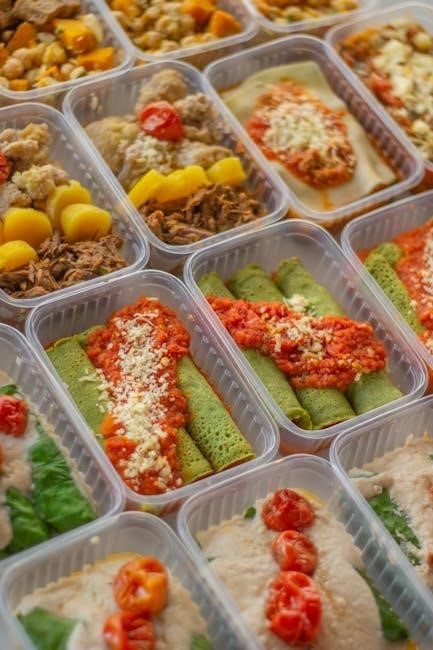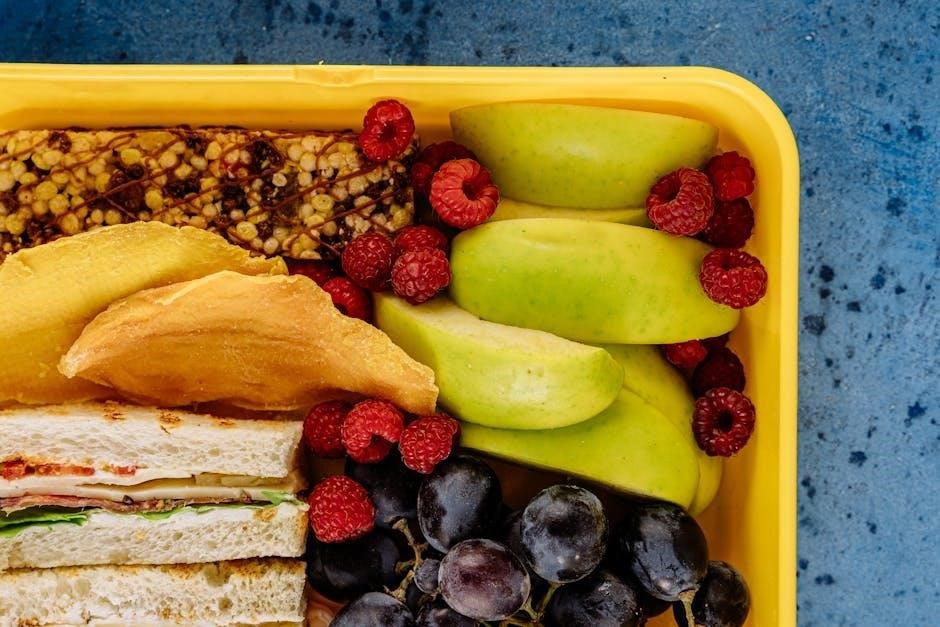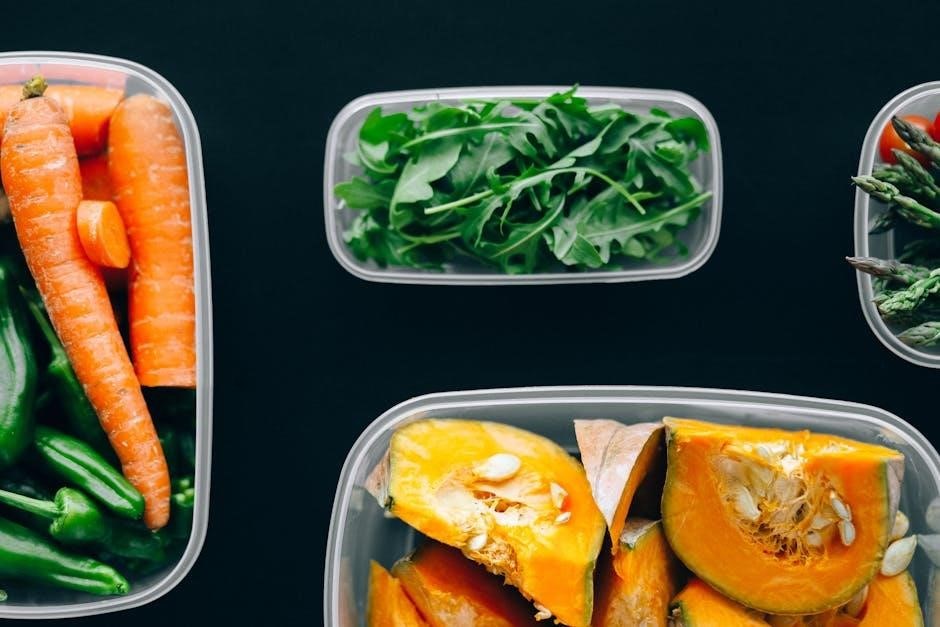ivf diet plan pdf
Discover the ultimate IVF diet plan PDF – your comprehensive guide to boosting fertility naturally. Easy-to-follow meal plans & expert tips. Download now!
Welcome to your guide to optimizing fertility through nutrition! Discover how a well-structured IVF diet plan can enhance your chances of conception and support your reproductive health. Learn about the importance of nutrient-rich foods, balanced meals, and lifestyle adjustments to create a fertile environment for success. This comprehensive plan is designed to empower you with knowledge and practical steps to nourish your body during your IVF journey.
1.1 Understanding the Importance of Nutrition in IVF Success
Nutrition plays a vital role in IVF success by supporting reproductive health and optimizing bodily functions. A balanced diet rich in essential nutrients helps regulate hormones, improve egg quality, and enhance overall fertility. By focusing on fertility-boosting foods and avoiding harmful substances, women can create a conducive environment for conception and increase their chances of a successful IVF outcome.
1.2 Overview of the IVF Diet Plan PDF
The IVF Diet Plan PDF is a comprehensive guide offering structured meal plans, shopping lists, and expert tips. It focuses on nutrient-dense foods, avoiding harmful substances, and incorporating Mediterranean diet principles. This resource provides practical tools to optimize fertility, supporting your IVF journey with actionable advice and downloadable materials for easy implementation.
Key Foods to Include in Your IVF Diet
Focus on nutrient-rich foods like fruits, vegetables, whole grains, lean proteins, and healthy fats. Incorporate nuts, seeds, and omega-3 rich foods to support fertility and overall health.
2.1 Fertility-Boosting Foods: Fruits, Vegetables, and Whole Grains
Fruits, vegetables, and whole grains are essential for fertility, providing antioxidants, vitamins, and minerals. Berries rich in vitamin C and antioxidants support hormone balance, while leafy greens like spinach offer folate for healthy cell growth. Whole grains, such as quinoa and brown rice, supply fiber and B vitamins, promoting energy and reproductive health. Incorporate these nutrient-dense foods to optimize your IVF journey.
2.2 Role of Lean Proteins and Healthy Fats
Lean proteins, such as poultry, fish, and legumes, support hormone production and egg quality. Healthy fats, including avocados, nuts, and olive oil, reduce inflammation and improve ovarian function. Omega-3 fatty acids from fatty fish and flaxseeds promote reproductive health. Incorporating these into your IVF diet plan enhances fertility and supports overall well-being during treatment.

2.3 Benefits of Nuts, Seeds, and Omega-3 Rich Foods
Nuts and seeds are excellent sources of healthy fats and minerals, supporting fertility and hormone balance. Omega-3 rich foods, such as flaxseeds, walnuts, and fatty fish, reduce inflammation and improve egg and sperm quality; Incorporating these into your IVF diet plan can enhance reproductive health and boost overall fertility potential naturally.
Foods to Avoid During IVF
Avoid processed, high-sugar, and unhealthy foods during IVF, as they can disrupt hormone balance and reduce fertility. Limit caffeine, alcohol, and artificial additives to support optimal reproductive health.
3.1 Limiting Processed and High-Sugar Foods
Processed and high-sugar foods can negatively impact fertility by causing insulin resistance and inflammation. These foods often lack essential nutrients and can disrupt hormone balance, which is critical during IVF. Opting for whole, nutrient-dense foods instead supports overall health and reproductive well-being, helping to create a more favorable environment for conception and successful treatment outcomes.
3.2 Reducing Caffeine and Alcohol Intake
Excessive caffeine and alcohol consumption can hinder fertility and reduce the chances of IVF success. Both substances can impair hormonal balance and egg quality, while alcohol may also affect embryo implantation. Limiting or eliminating these from your diet is recommended to optimize reproductive health and support your IVF journey effectively.
3.3 Avoiding Unhealthy Fats and Artificial Additives
Unhealthy fats, such as trans fats, and artificial additives in processed foods can cause inflammation and disrupt hormonal balance, negatively impacting fertility. Opt for natural, whole foods and avoid products with artificial preservatives or colors. Choosing healthy fats, like avocados and olive oil, supports reproductive health, while minimizing exposure to harmful additives promotes a fertile environment;

The Mediterranean Diet and IVF Success
The Mediterranean diet, rich in fruits, vegetables, whole grains, and healthy fats, has been shown to improve IVF outcomes by promoting hormonal balance and overall reproductive health.
4.1 Benefits of the Mediterranean Diet for Fertility
The Mediterranean diet boosts fertility and IVF success by providing essential antioxidants, omega-3 fatty acids, and fiber. It improves embryo quality, supports hormonal balance, and enhances overall reproductive health. Rich in olive oil, fruits, vegetables, and whole grains, this diet promotes a healthy weight and reduces inflammation, key factors for optimal fertility outcomes. Studies and experts endorse its benefits for IVF candidates.
4.2 Structuring Your Mediterranean Diet Plan
Focus on whole grains, vegetables, and healthy fats like olive oil. Include lean proteins such as fish and poultry, while limiting red meat. Incorporate legumes, nuts, and seeds for essential nutrients. Hydrate with water and herbal teas, and limit processed foods. Aim for balanced portion sizes and meal frequency, tailored to your lifestyle. Plan meals with fresh, seasonal ingredients for optimal fertility support.
Sample 7-Day IVF Diet Plan
This 7-day IVF diet plan provides daily meal ideas, ensuring balanced nutrition with fertility-boosting foods. Download the PDF for detailed breakfast, lunch, and dinner recipes tailored for IVF success.
5.1 Daily Meal Ideas for Breakfast, Lunch, and Dinner
Start your day with a nutrient-packed breakfast like a spinach and feta omelet or Greek yogurt with berries. Lunch options include grilled chicken salads or quinoa bowls with roasted vegetables. Dinners might feature baked salmon with sweet potatoes and broccoli or lentil stir-fries with brown rice. Snacks like almonds or apple slices keep energy levels steady. These meals provide balanced nutrition, supporting fertility and overall health during your IVF journey.
5.2 Snack Options to Maintain Nutrient Balance
Nourishing snacks like fresh fruits, raw nuts, and seed mixtures provide essential vitamins and minerals. Greek yogurt with honey or a handful of berries offers a natural energy boost. Veggie sticks with hummus or avocado slices support healthy fats and fiber intake. These snacks help maintain balanced nutrition, ensuring your body stays fueled and fertile throughout the day.

Importance of Nutritional Supplements
Nutritional supplements play a crucial role in filling dietary gaps, supporting hormone balance, and enhancing fertility. They provide essential vitamins and minerals, improving reproductive health and IVF success rates.
6.1 Essential Vitamins and Minerals for Fertility
Folic acid, iron, calcium, and omega-3 fatty acids are vital for fertility. Folic acid prevents birth defects, while iron supports blood flow to reproductive organs. Calcium strengthens embryo development, and omega-3s reduce inflammation, improving egg and sperm quality. These nutrients, often supplemented, ensure optimal reproductive health and enhance IVF outcomes, balancing hormones and supporting overall well-being during treatment.
6.2 Role of Folic Acid and Iron in IVF Success
Folic acid is crucial for preventing birth defects and supporting DNA synthesis during early pregnancy. Iron ensures proper oxygen flow to reproductive organs, improving egg and sperm health. Both nutrients enhance IVF outcomes by supporting hormone balance, embryo development, and overall reproductive function, making them essential components of a fertility-focused diet.

Maintaining Acid-Alkaline Balance
Balancing your diet’s acidity and alkalinity supports reproductive health. A slightly alkaline environment, achieved through foods like fruits and vegetables, optimizes fertility and IVF success.
7;1 Understanding the Impact of Diet on pH Levels
Diet significantly influences your body’s pH levels, with acidic foods like processed meats and sugars disrupting balance. Alkaline-rich foods, such as leafy greens and citrus fruits, help maintain a slightly alkaline environment, crucial for reproductive health and IVF success. A balanced intake ensures optimal bodily functions, supporting hormone regulation and embryo development.
7.2 Alkaline-Rich Foods to Include
Incorporating alkaline-rich foods into your IVF diet helps maintain a balanced pH level, essential for reproductive health. Include leafy greens like spinach and kale, citrus fruits such as lemons and oranges, and other alkaline-promoting foods like almonds, cucumbers, and bell peppers. These foods support a slightly alkaline environment, optimizing conditions for conception and embryo development.

Customizing Your IVF Diet Plan
Tailor your IVF diet to personal needs and medical conditions like PCOS. Adjust based on preferences and seek expert guidance for optimal results and increased fertility potential.
8.1 Tailoring the Diet for PCOS and Other Conditions
For women with PCOS, a tailored IVF diet focuses on balancing blood sugar and hormone levels. Incorporate anti-inflammatory foods, whole grains, and lean proteins. Avoid high-sugar and processed foods. Mediterranean-inspired meals and omega-3 rich options are beneficial. Personalized plans may include specific supplements or restrictions based on individual health needs. Consult a dietitian for a customized approach to optimize fertility outcomes and manage symptoms effectively.
8.2 Adjusting the Plan Based on Personal Preferences
A successful IVF diet plan should align with your lifestyle and preferences to ensure adherence. Incorporate foods you enjoy while maintaining nutritional balance. For cultural or dietary restrictions, adapt recipes using suitable alternatives. Consult a dietitian to tailor the plan to your needs, ensuring meals are satisfying and sustainable. Flexibility and variety are key to long-term success and preventing burnout.
Your IVF journey begins with informed dietary choices. By following a tailored IVF diet plan, you can optimize your fertility and enhance treatment success. Download the IVF Diet Plan PDF to access comprehensive guidance, meal ideas, and expert recommendations, empowering you to make nutritious decisions and take the next steps confidently toward parenthood.
9.1 Summary of Key Dietary Recommendations
- Focus on whole, nutrient-dense foods like fruits, vegetables, whole grains, and lean proteins.
- Incorporate healthy fats, nuts, seeds, and omega-3 rich foods.
- Limit processed foods, high-sugar snacks, and unhealthy fats.
- Stay hydrated and avoid excessive caffeine and alcohol.
- Consider supplements like folic acid and iron after consulting a healthcare provider.
- Download the IVF Diet Plan PDF for tailored meal ideas and expert guidance.
9.2 How to Download the IVF Diet Plan PDF
To access the IVF Diet Plan PDF, visit the official website or trusted health portals offering fertility resources. Click the download link, provide your email if required, and save the file. This PDF offers comprehensive meal plans, shopping lists, and expert tips to support your IVF journey. Download now and start nourishing your path to parenthood!

Additional Resources
Explore further guidance through downloadable PDFs, expert recommendations, and additional tools to support your IVF journey. Visit trusted websites for comprehensive resources and expert-backed materials.
10.1 Free IVF Diet Plan PDF Download Links
Access free downloadable resources, including the 14-Day Fertility Meal Plan from Sims IVF and a 28-Day Mediterranean Diet Plan for IVF success. Visit trusted websites like Sims IVF and Complete Fertility for comprehensive guides. These PDFs offer meal ideas, shopping lists, and expert tips to support your IVF journey. Download now and start nourishing your path to parenthood.
- 14-Day Meal Plan
- 28-Day Mediterranean Plan
These resources are designed to help you optimize your diet for IVF success. Check with your clinic for additional personalized guides.
10.2 Recommended Reading and Further Guidance
Explore books like “The Fertility Diet” by Dr. Jorge Chavarro and “The IVF Diet” by Dr. Constantinos Kallias for in-depth insights. Visit trusted fertility clinics’ websites for expert guides and downloadable resources. Check out Sims IVF and Complete Fertility for comprehensive support materials. These resources offer expert-backed advice tailored to your IVF journey.

